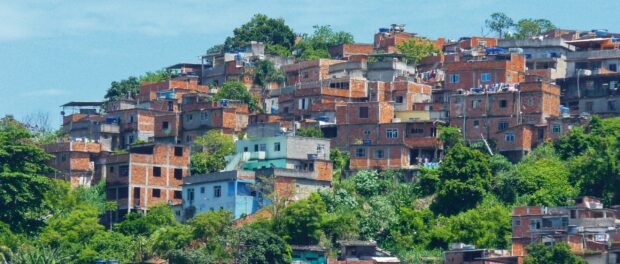
Last Thursday night, students, public intellectuals, regular Cariocas, government officials, and some foreign tourists gathered at the Voluntários da Patria School in Ipanema to discuss problems surrounding favelas. The event was planned by Henrique Mello, a history teacher at the school. “I wanted to start a conversation about the current problems facing favelas in Rio de Janeiro, and I really think my students would benefit from hearing a wide array of perspectives, so I invited people from different backgrounds,” said Mello, gesturing in the direction of a French couple. Mello plans on continuing these meetings to attempt to push the government of Rio to take action. He believes that if wealthy South Zone residents speak up about the problems in the favelas, the City will do something.
The meeting began with attendees breaking into small discussion groups to discuss how to improve favelas. The groups then came together and presented their ideas and solutions.
Some groups proposed creating more cultural centers in favelas, which would be the same in each favela because all favelas are the same. “I think favelas need cultural centers where kids can go instead of getting involved with drug traffickers,” said Marina, a student at the school. “I think that’s the most pressing issue for each favela in Rio.” Another group pointed out that if favelas are to improve, the residents have to become “more cultured,” something these cultural centers could help with.
Anna, a tourist from an undisclosed country only showed up to the meeting to learn more about real estate values in specific favelas. “I would like to buy property in Vidigal,” she explained. “I’ve heard that because of the devaluation of the real, many expensive properties are now affordable.” Other tourists said they were there because they wanted to learn more about favelas but were too scared to visit one.
With twenty minutes left of the meeting, Fabio, a resident of Complexo da Maré walked into the meeting. No favela residents had been invited by the event organizer, but Fabio had read about the meeting on Facebook. He apologized for his late arrival, saying: “I only found out about the event today. I would have arrived on time but since the City cut multiple bus lines coming from North Zone to the South Zone, I was forced to transfer buses several times.”
Fabio began to talk about his neighborhood’s needs, focusing on sanitation, health and educational deficits, but was quickly cut short by Maria Campos, a university professor: “I’ve studied favelas for a very long time and I currently teach what life is like in favelas. I don’t think this man’s story is accurate. I would know, I’m a specialist.” After this, Fabio was politely told that if he kept interrupting the meeting he would have to leave.
Following the event, participants walked back to their nearby homes and hotels.
Please note this is a satirical piece and all names are fictitious. Any similarity to an existing person or event’s name is completely coincidental.
